You don't need a promise, you need a plan & Bring people together, at the right time
in this week's issue of Creativerly: The easiest way to have productive meetings, you've never designed this easy before, discover privacy-first productivity tools, and a lot more.
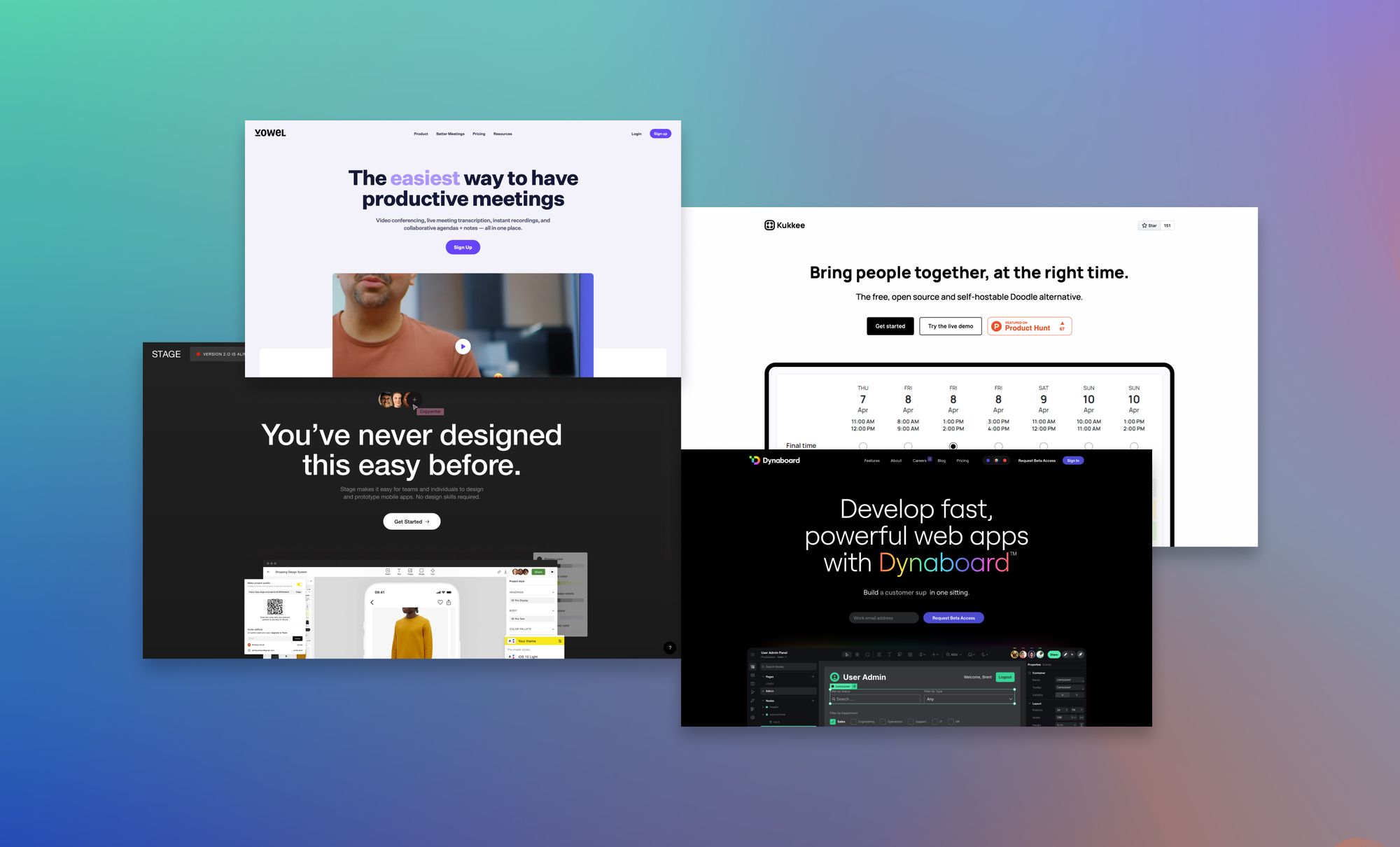
You are reading Creativerly, the weekly digest about creativity and productivity-boosting tools and resources, combined with useful insights, articles, and findings from the fields of design and tech. The newsletter built for the creative community.
Hey and welcome to Creativerly 165 👋
Over the last couple of weeks, I have found out about an increasing number of apps with a dedicated focus on capturing ideas, thoughts, and notes quickly, on the go, without any hassle. Apps like Weavit, Voiceliner, Quick Capture, Hints, and others become increasingly popular. All those apps have in common that they give the user the possibility to quickly capture any kind of notes or thoughts, while on the go, during your commute, sitting in a café, or while working out.
While we are living in a fast-paced world, most note-taking and PKM tools do not live up to that speed. That means some of the most popular note-taking and PKM tools struggle to give the user a dedicated possibility to capture something real quick. Personally, I use Craft as my go-to note-taking and PKM tool. Before I am able to capture something within seconds, I have to decide where I should capture it, in a dedicated folder, document, page, whatsoever. This friction layer can be a disadvantage while capturing thoughts on the go. I do not want to have to worry about where I need to place a certain kind of information. I just want to be sure that whenever I need to come back to it, I know where I can find it again. Tools like Obsidian and Logseq handle this kind of behaviour better, although you need to use dedicated community plugins to achieve it, for my understanding. In Craft, loads of users also hacked together a workflow with iOS Shortcuts to send quickly captured notes and thoughts to todays’ daily note and append it at the end. Other users set up an „inbox“ document, which is a file only for capturing quick notes.
At this point, I asked myself why some sort of quick capturing functionality is not built into most of the popular note-taking tools natively. Especially, as it seems to be a hugely popular workflow according to the communities around Obsidian, Logseq, and Craft. Based on that, I can clearly see the benefit of tools like Weavit or Hints that give the user the possibility to literally capture any kind of information within seconds. There is the drawback, that if you are looking for this kind of workflow, you would need to add another tool to your workflow tech stack. On the other hand, this could also be an advantage, since you would be able to have a specific place for quickly captured ideas, thoughts, and notes to which you can come back at any time. Tools like Weavit also give you a helping hand and connect similar topics, events, and people for you. Hints goes even one step further and let you take notes, create tasks, and set reminders via SMS, WhatsApp, or Telegram, use a shortcut to capture selected text or screen area, and convert your voice messages to text. Additionally, Hints is not only available for iOS, but there is a dedicated macOS and Web App, which means you can process notes and ideas captured on the go in front of your Mac.
What is your opinion about quick capturing apps and functionality within the most-popular note-taking tools? Do you rely on bespoke apps and features? Or do you not care about the friction to open your note-taking app, search for the right folder, tag, document, page, to capture a thought or idea on the go? Let me know. I am excited to hear your thoughts about the rise of quick capturing apps.
Privacy-friendly web analytics for your peace of mind.
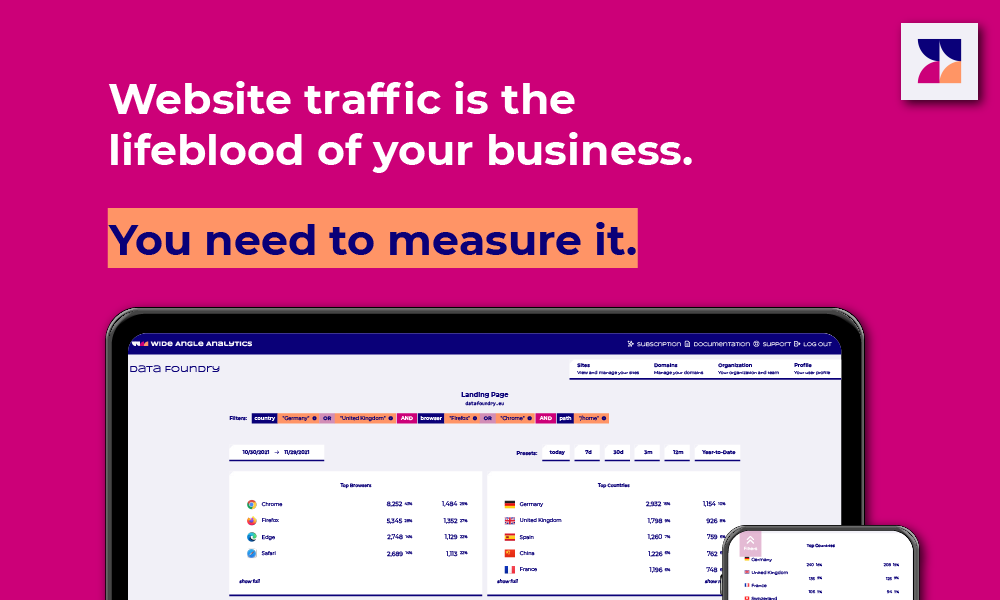
Wide Angle Analytics (Sponsored) →
Wide Angle Analytics is a cookieless alternative to Google Analytics. Uncover value with colourful charts and flexible filters. Improve tracking quality and avoid AdBlockers. Invite others to collaborate. Pay per site, not the number of visits. Focus on business, not the limits. Try risk-free!
Apps, Software, Tools
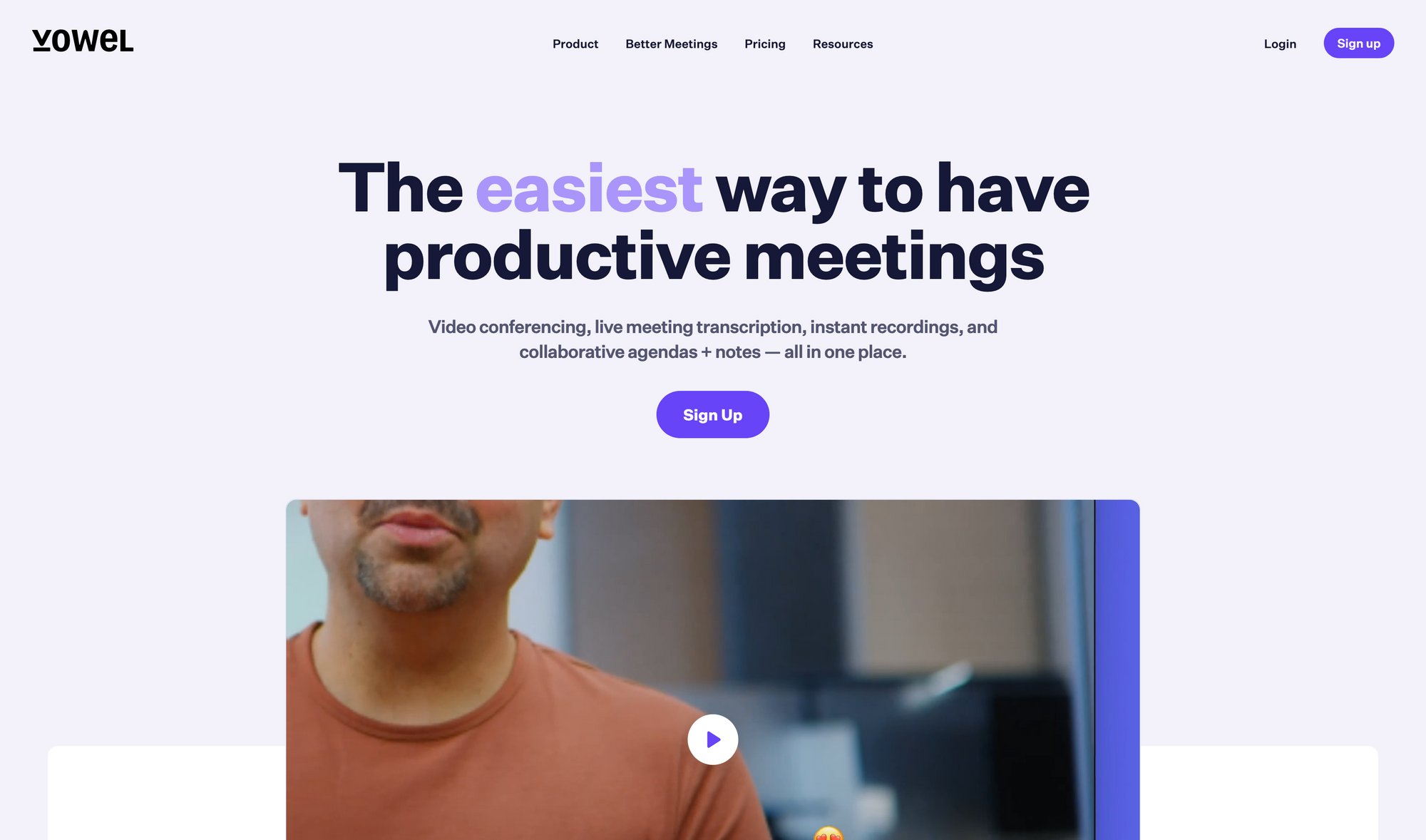
Vowel →
Most nowadays meetings happen online, in front of a computer with a webcam pointing at you. On the computer, you will probably find conferencing software like Zoom or Slack. Whenever I have to use Zoom, I always get reminded how mind-blown it is that a company worth north of $30b, employing over 4,400 people, manages to build such a bad software, with an unintuitive interface, scraping user data, constant bugs, and simply being the nightmare of teams and colleagues who are meeting online. Therefore, I am thankful for companies that are building powerful Zoom alternatives, just like Vowel does.
Vowel is a powerful tool for video conferencing purposes but it adds several features on top of that make your meetings delightfully productive. First of all, Vowel already helps before the meeting even has started, as Vowel offers the possibility to plan and share your agenda. This gives everyone who will be part of the meeting, the chance to come prepared to actively contribute to the meeting. During the actual meeting, you do not have to worry about missing any kind of ideas, as Vowel includes live transcription. That means, while you are having your meeting, Vowel will transcribe whatever is said. Based on the process of transcribing meetings, you get the chance to go through the meeting, and the ideas and decisions once again, take additional notes and act on everything. Vowel gives you the opportunity to share highlights from a meeting with the team, rewatch the key moments, and ensure everyone is on the same page.
To put your agenda in context, you can integrate Google Calendar with Vowel to create and distribute an agenda for all your upcoming meetings. Besides the incredible powerful transcription feature of Vowel, it also features some traditional functionality, like reacting with emojis, sharing a comment, or raising your hand if you want to add something to the discussion. In addition to that, Vowel lets you also create and take notes, even with your colleagues all together you can jot down actionable notes collaboratively within one page. Another incredible feature of Vowel is the search. Without any hassle, you can basically CTRL + F your meetings and quickly search and find who said what in the meeting transcript. Vowel is the perfect tool no matter if you want to hold an All-Hands meeting, a 1-on-1, a design review, a research session, or anything else. Vowel delivers the features you need to stay productive during meetings.
As all of this wasn't already enough to ditch Zoom and move all your meetings to Vowel, I am excited to tell you that Vowel takes privacy and security for video conferencing seriously. They combine enterprise-grade security features with regular audits to keep your team and your data protected. Vowel is currently in beta, and as long as it is in beta, you can use it for free. In fact, once Vowel is out of beta there will always be a free plan. All plans include the fast transcription search, recoding possibilities, and notes and agendas.
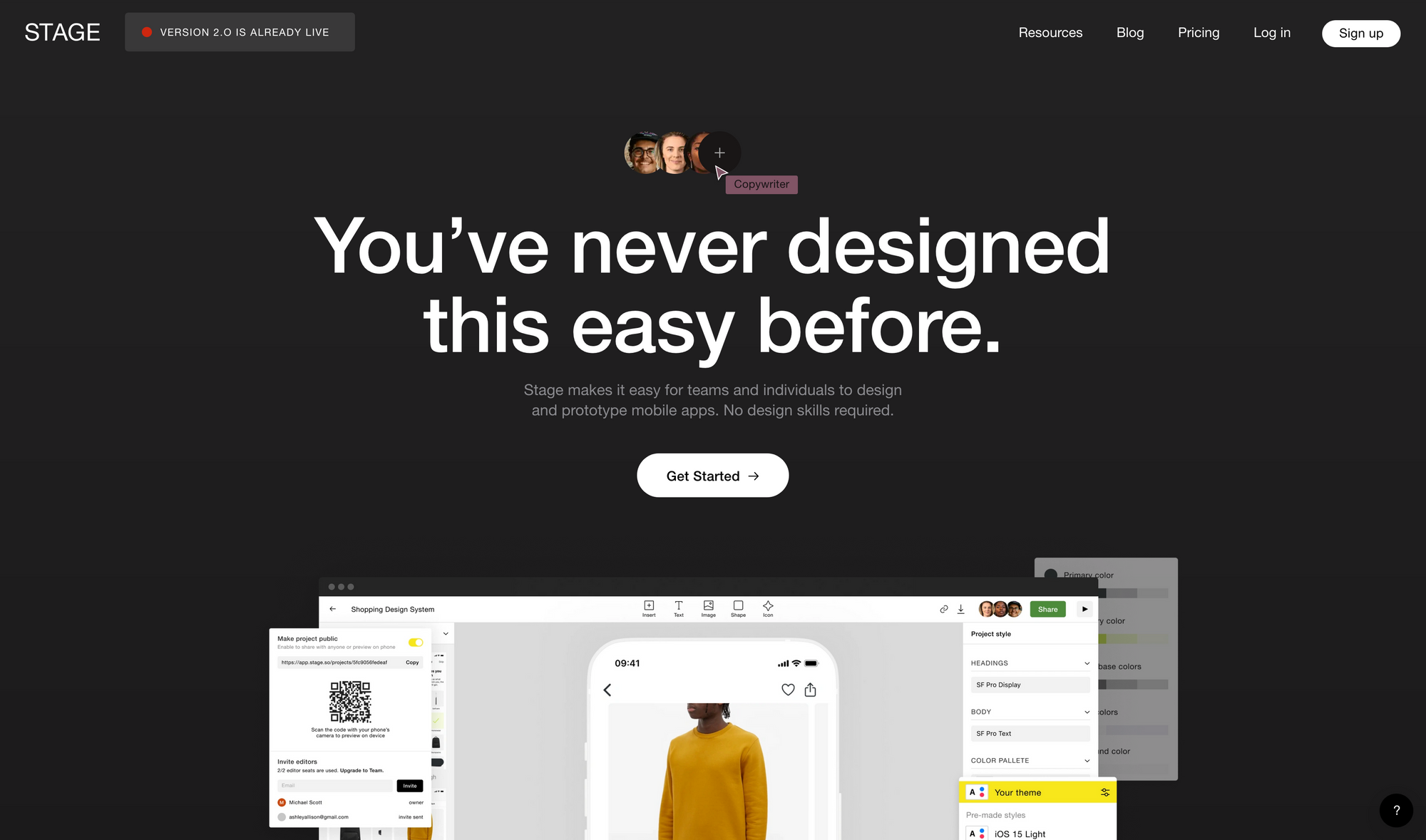
Stage →
With the continuous rise of design tools like Figma and Sketch, it is exciting to see that there are companies looking to make design tools accessible for everyone, so teams and individuals can design and prototype mobile apps with ease. Stage is one of those companies, aiming to deliver the tools and features to design whatever comes to your mind, no design skills are required. At the core, Stage wants to help you go from wireframe to production fast.
Tools like Figma or Sketch have a certain kind of learning curve. Stage wants to help you to design stunning mobile apps without being a designer or hiring one. With Stage you can quickly visualise your idea. On top of that, it gives you one dedicated workspace for your whole design process. There is no need to switch to different tools to wireframe, design, and prototype. Stage is offering ready-made components which you can drag and drop to create wireframes in minutes. Those components can then be customized to your needs using intuitive settings. The idea behind this was to eliminate complexity and only focus on what you want to create. When you feel your wireframes are done and you want to move on to the polishing phase, Stage is ready and prepared for high-fidelity design. With just a few clicks you can set up brand colours and typography, which will then be implemented in your designs. Stage goes even one step further and gives you the functionality to create prototypes to get a feel of how your designs actually work on a device. No code is needed. Build prototypes fast and validate your ideas and your designs on real users.
Unlike other design tools, Stage is offering design system templates with hundreds of unique patterns and components specially made for certain use cases. No matter if you want to design a shopping app, a task management tool, or if you want to build something with the iOS 15 interface design elements, Stage got you covered by providing you with hundreds of components and mobile screens to kick off your next project. One of the huge advantages of Stage is the fact that it was built to make iterations fast and easy. Stage lets you try on different styles instantly, as you switch between pre-made themes to experiment. On top of that, Stage is based on elements and components. At this point, it got clear to me why Stage is claiming that its tool lets you design mobile apps without any kind of design skills. While other tools like Figma and Sketch give designers and creative minds the to craft, design, and build their own components, Stage offers you hundreds of resizable and customizable smart components structured and organised by categories, from buttons to widgets. Additionally, Stage gives you access to a wide range of mobile screens as part of their pattern library.
Stage will not replace or compete with tools like Sketch or Figma, I think that is not their focus and their website makes that clear to me. Instead, Stage is a tool that gives literally everyone on your team the ability to quickly create and design specific ideas. There is always the possibility to move to another tool afterwards and add the screens to your designs in Sketch or Figma. Here is a real-world example, where I think Stage can really shine and unfold its potential: you are in a meeting with several people from different departments, discussing new features and therefore new screens. Instead of pushing pixels, creating rectangles, and setting fonts and colours manually, you want everyone to get involved, jumping into Stage and quickly designing their ideas with Stage‘s pre-built components. Once the idea is clear, the designers can then start polishing everything within their design tool of choice.
You can use Stage for free forever, for up to 5 screens per project, one active project, and two editors per project. The Professional Plan will cost you $8 per month (billed yearly) and gives you add to what is included in the free plan, unlimited projects and screens, all templates and patterns, and export to Figma and PNG. For teams, the Team Plan will cost $27 per month (billed yearly) for up to 5 editors, collaborative features, premium support, and everything that is already included in the Professional Plan. The
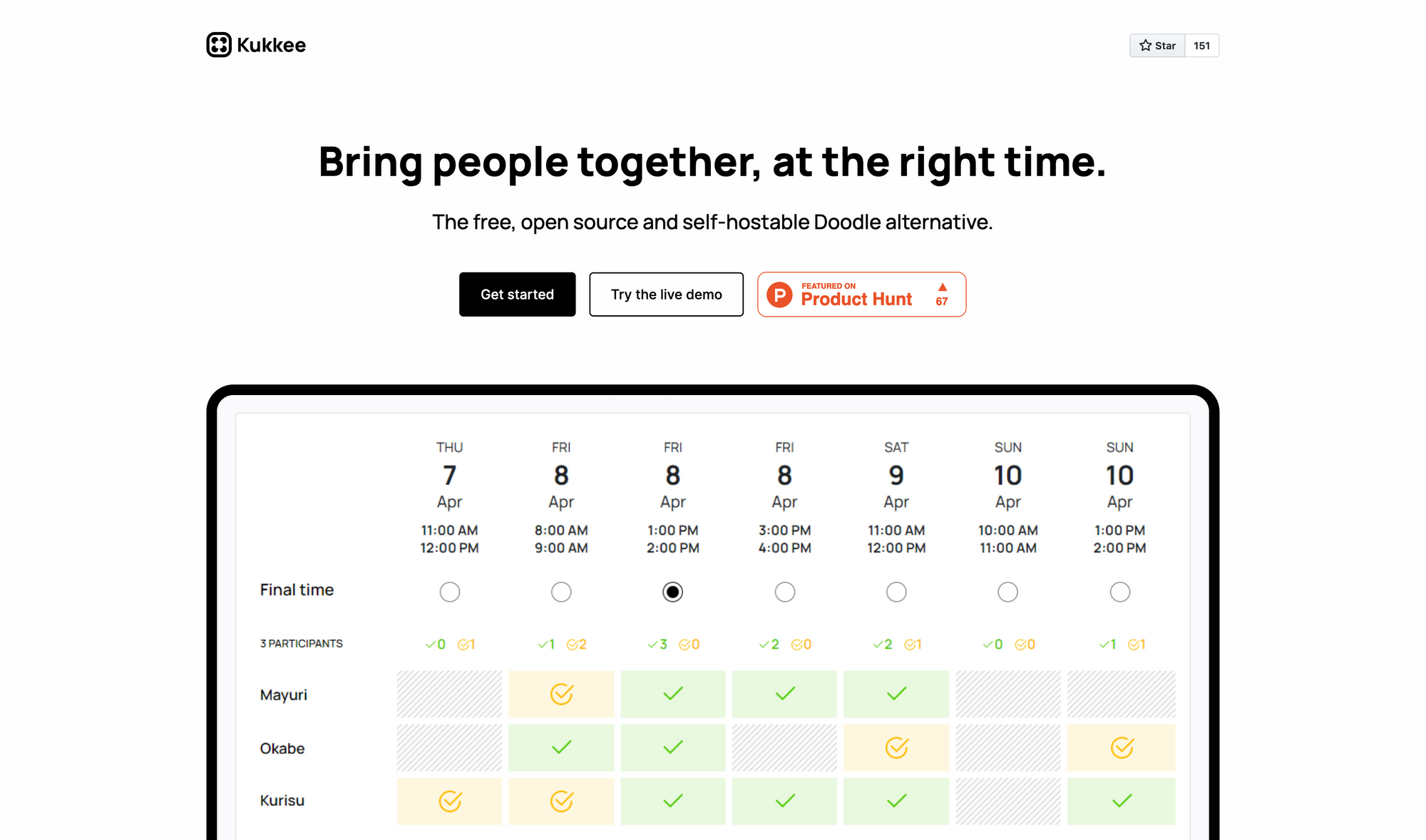
Kukkee →
I am pretty sure that most of my readers have used or at least came across Doodle, the tool to create meetings and online surveys. Loads of individuals and companies use the tool. But at what cost? At the cost of privacy? Personally, I always think that if some companies and tools do not state publicly that they respect their users‘ privacy there is always something hiding under the hood. In fact, what is publicly available regarding Doodle is the fact that they use Google Analytics on their website to gather user insights and data, and we probably all know why Google Analytics is just bad.
Therefore, I am excited to present to you a free, open-source, and self-hostable Doodle alternative, called Kukkee. One of the most common use cases of Doodle is creating meeting surveys to find out what time works for all the team members. But instead of using Doodle and asking „What time works for you all?“, create a poll, share it, wait for the participants, and finalize the time, all with Kukkee. With Kukkee you do not get any disturbing ads and your data always stays yours. Since Kukkee is open source, you get full access to the codebase, and security assurances, and you are able to make or request any changes. Kukkee is the only Doodle alternative I know of, that you can host yourself. This gives you full control. There is no need to give up on data privacy. You can set up and get Kukkee running on your own server literally in minutes. Stay in control of your data, branding, and costs all the time.
Besides that, Kukkee lets you easily share your availability for a meeting through a poll. After you sent it to the participants they can narrow it down. With ease, you will be able to see who is free, and who is not. Additionally, Kukkee gives every participant the possibility to vote without an account. This is possible because of public polls. On the other hand, you can also only let participants vote who only have an account through protected polls. Another benefit of Kukkee, is the fact that it automatically shows the participants the time in their local time zone, therefore, there is no time zone confusion. Kukkee is still in an early stage, which means there is a bright roadmap ahead. You can also actively participate in shaping Kukkee‘s roadmap as the company lets you take part in the discussions around future features like the possibility to connect calendars, deadlines, video conferencing integrations, email notifications, comments, and a lot more.
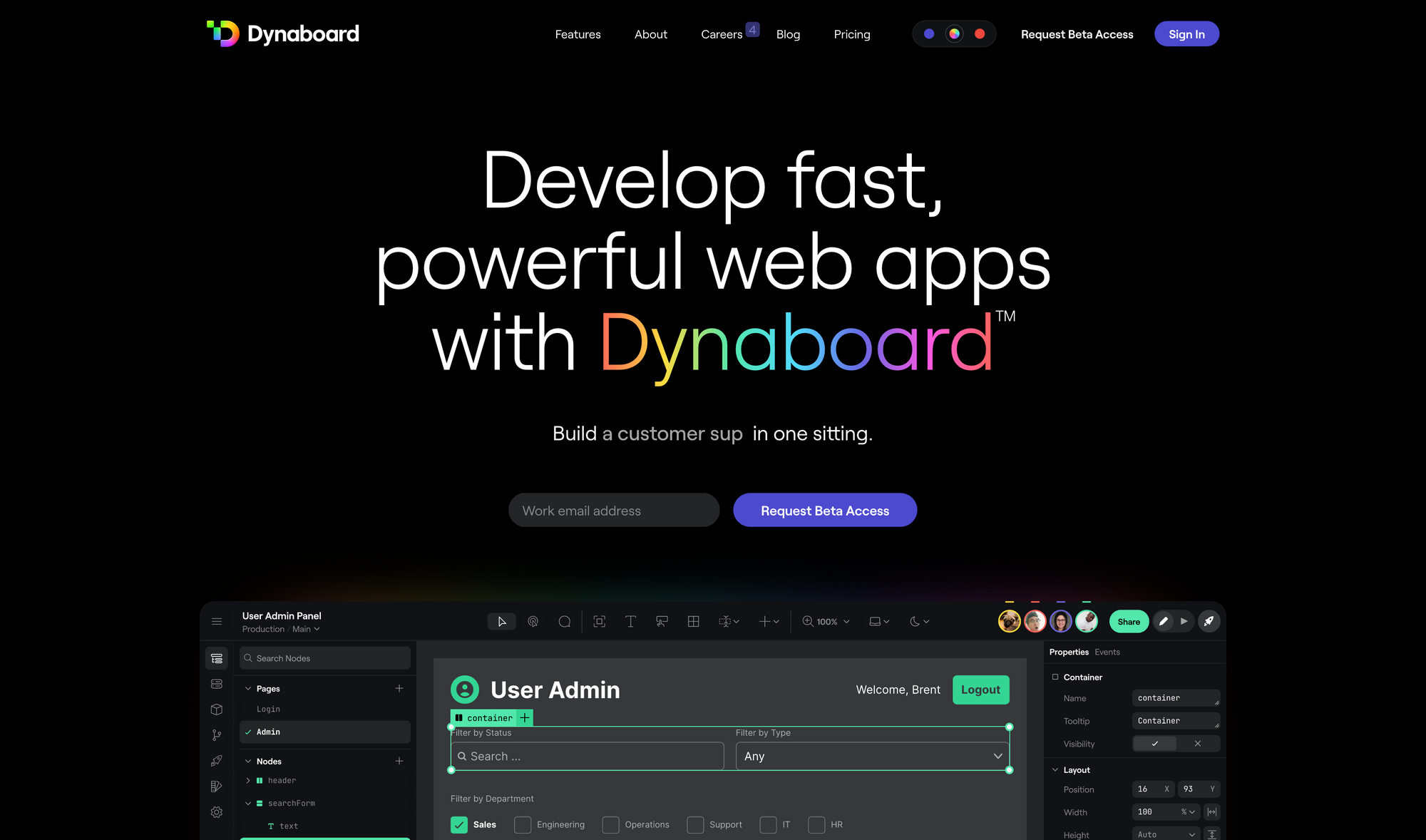
Dynaboard →
Dynaboard is a beautiful piece of software that lets you develop fast and powerful web apps. No matter if you want to build an internal tool, an MVP, a partner portal, or anything else you could think of, Dynaboard is an up and coming tool that delivers all the features and functionalities to build a full-stack web app in one place.
First of all, Dynaboard lets you build and create apps powered by Notion, React, Airtable, Google Sheets, GraphQL, and others. With Dynaboard your development process becomes 10x faster. It comes with a customisable component library packed with buttons, form elements, tables, charts, layout primitives, and a lot more. There is no longer the need to select frameworks first and export your designs. Dynaboard gives you the power to build and ship literally in minutes. It is also exciting that Dynaboard has a cross-team focus at the core, as you can collaborate in real-time on both code and UX. Leave comments, or debug issues with your teammates instantly and simultaneously, everyone gets a live preview and there is no need to wait on a build to complete. Dynaboard turns web app development into a multiplayer experience.
Wherever you want, you can add custom code to your apps, both on the client and the server. On top of that, Dynaboard lets you connect any of your APIs or databases so you can create interactive experiences using charts and data tables. So you do not have to start from scratch, Dynaboard offers a wide range of templates. Out-of-the-box web apps with open source code, so you only need to fork a template and start shipping. Whenever you feel you and your web app are ready, you can deploy it immediately with one click. Dynaboard is currently in private beta as they just recently launched to the public. You can sign up for early access and get an update once you can hop on its platform.
Useful Resource
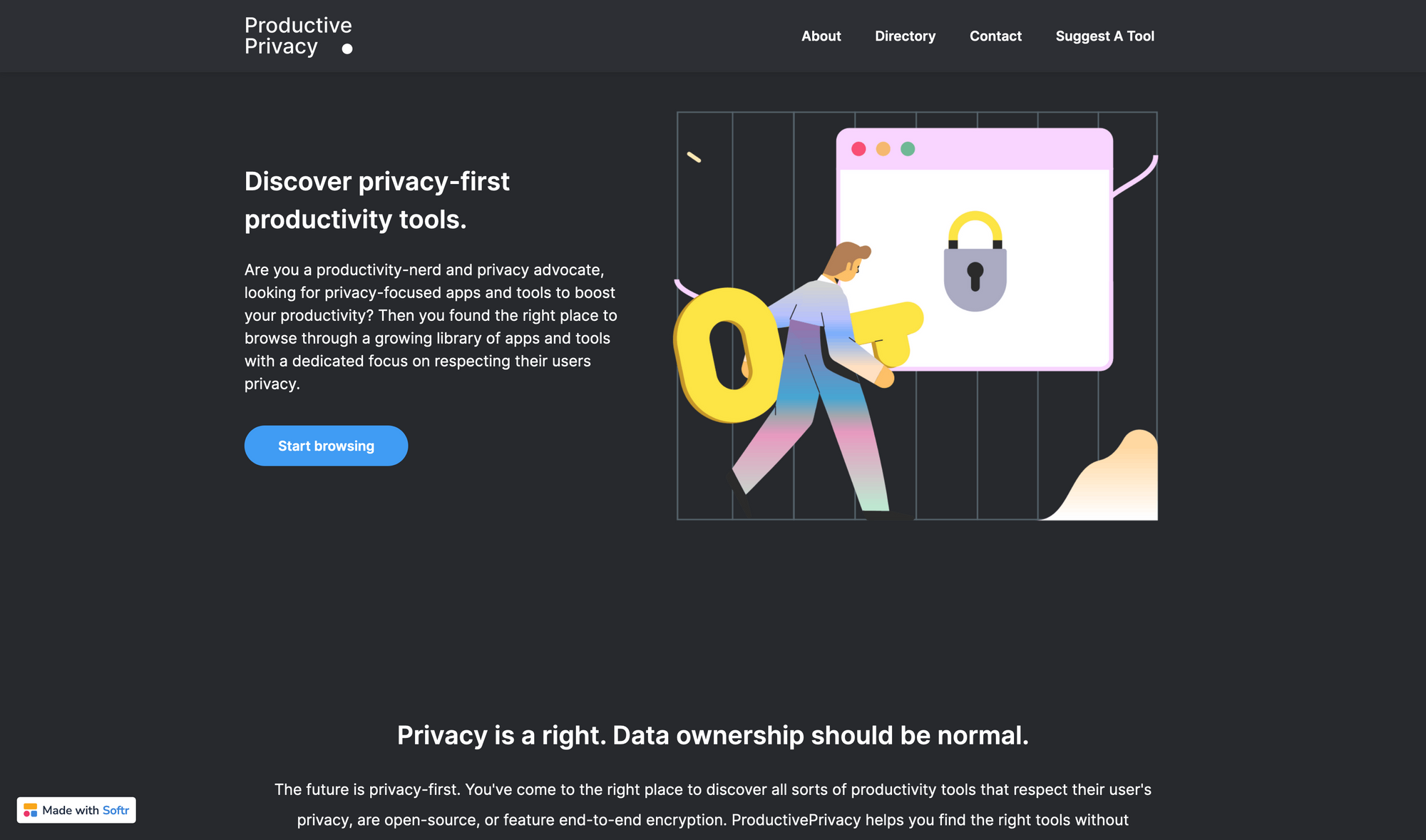
ProductivePrivacy →
If you are a privacy advocate and on the hunt for productivity tools that do respect their users’ privacy, make sure to check out ProductivePrivacy. ProductivePrivacy is a directory packed with productivity tools from categories like note-taking, project management, task management, and more. All the tools featured within the directory, have a dedicated focus on privacy, and are open source, or feature end-to-end encryption. Head over to ProductivePrivacy.com and browse through the category.
Mental Wealth
➢ How The Simple Act of Showing Up Can Make You Successful – “In 2010, during the Great Recession, my dad and I decided to start a business. I was still in grad school and realized I had little chance to land a good job because the economy was still recovering from the financial crisis. As a minority, getting a job was even more difficult. I looked at the job market, the economy, and my little experience, and figured I had little chance of getting a good opportunity.”
➢ The case for 'sustainable productivity' and how to measure it – “It’s not an easy time to be a worker. Zoom fatigue and collaboration fatigue are leaving remote workers mentally drained and physically exhausted, but the prospect of returning to the office has brought its own stress. At the same time, multiple studies point to an increase in employee productivity since the beginning of the pandemic. This is due partly to the flexible schedules that are possible with remote work — but also an increase in weekend work.”
➢ You Don’t Need a Promise, You Need a Plan – “I sleep better when I don’t eat snacks after dinner, especially junky carbohydrates, so last week when I visited a friend’s house I made a specific resolution to decline all such snacks. Sure enough, as though the scene was a moral fable I had written myself, I was at one point handed an open bag of Doritos. I then watched myself pull out a handful of chips and start eating them, while making a resolution for next time.Later, when the Doritos were reduced to crumbly fragments barely worth fishing out of the bag, I reflected on what had gone wrong, and remembered something I discovered years ago about resolutions but forget constantly.“
➢ Think You’re Entitled to Your Opinion? Think Again – “Last month, I wrote about what it means to really win an argument—how sometimes “winning” can actually be losing and how “losing” can actually be winning. What there wasn’t room in that article for was to discuss how a lot of arguments are completely unnecessary or ridiculous due to the fact that many of the so-called opinions thrown around these days are quite frankly illegitimate. But as a quick glance through any popular social media platform reveals, this doesn’t stop people from arguing over those illegitimate opinions anyway.”
Classifieds
- Join The Study Newsletter: A biweekly laid back newsletter about very serious ideas from dense books, long-forgotten thinkers, and more. Great for creators and wanderers alike.
- Craftwork is offering high-quality interface assets for designers & startup creatives. No matter if you are looking for illustrations, UI kits, or icons Craftwork got you covered.
- Join 50k+ smart people on Refind and get 7 new links every day that make you smarter, tailored to your interests, curated from 10k+ sources.
If you are interested in putting your tool, product, or resource in front of over 1600 creative minds, consider advertising in Creativerly and book a sponsor or classified ad spot. Find all the important information at creativerly.com/advertise.
Appendix
➢ ICYMI
Highlight your app, tool, resource, or service in front of over 1600 creative minds coming from different backgrounds like design, development, journalism, VC, Indie Hacking, and others. The Creativerly audience is actively looking for tools and resources which boost their creativity and productivity. If you are interested in booking a sponsor spot in Creativerly head over to creativerly.com/advertise for all the important information.
➢ Quick Bits
- The U.S. just took a big step toward regulating AI
- Apple’s privacy focus means fewer app features, slower development, say company’s own engineers
- Before Google kills free G Suite accounts, why not offer a family email plan?
- Apple is reportedly testing M2 chips in at least nine new Macs
- TikTok is under investigation over child sexual abuse material
- Twitter board fights Musk takeover with unanimous adoption of poison pill
- Microsoft reportedly wants to bring ads to free-to-play Xbox games
- DuckDuckGo Removes Pirate Sites and YouTube-DL from Its Search Results
- WhatsApp Doubles Down With End-to-End Encrypted ‘Communities’
- Apple’s still not catching scammy apps, and this time they’re on the Mac
Twitter thoughts
Is "tools for thought" a scientific field? A design discipline? A "scene" in the arts? A tradition of craft? Day to day—what should I do today?—I feel pulled wildly between these framings.
— Andy Matuschak (@andy_matuschak) April 15, 2022
Newly unlocked "letter from the lab" on navigating this tension: https://t.co/tgzuvl4oC9
Till next time! 👋
Support: Do you have a friend who is looking for inspiration, news about design, and useful tools and apps? Forward this newsletter to a friend or simply share this issue and show some support. You can also show some love by simply clicking the button down below and keep this newsletter a sustainable side-project by buying me a coffee. ☕️ 🥰

Some of the links in my newsletter and my blog posts are affiliate links. Those links are marked by an asterisk. If you buy something through the link, the product will not cost you anything more, but I will receive a small commission which not only supports Creativerly and my work but also helps me to keep this publication a sustainable side-project.



Discussion